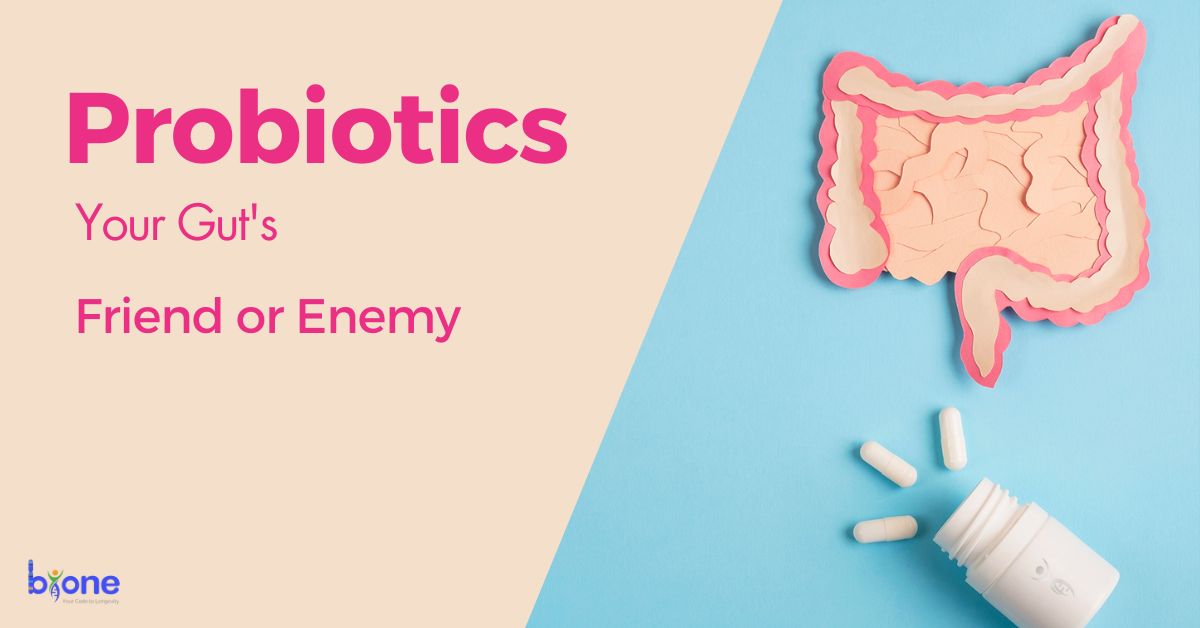
Skin health can also benefit frWhen it comes to gut health, the buzz around probiotics is hard to miss. These tiny microorganisms are often hailed as digestive superheroes, promising a wide range of health benefits. But are probiotics truly your gut’s best friend, or could they potentially be a hidden enemy? In this article, we’ll dive deep into the world of probiotics, separating fact from fiction, and helping you make informed decisions about your gut health.
Understanding Probiotics
Before we explore whether probiotics are a friend or foe, let’s get to know them better. Probiotics are live bacteria and yeasts that are good for your health, especially your digestive system. They are commonly found in fermented foods like yogurt, sauerkraut, kimchi, and in supplement form.
The Role of Probiotics:
Probiotics are primarily known for their role in maintaining a healthy balance of bacteria in the gut. They help keep harmful bacteria in check and aid in digestion. But their benefits go beyond the gut. Research suggests that probiotics may also support immune function, improve skin health, and even influence mental well-being.
Probiotics: Your Gut’s Best Friend
1. Digestive Health Support
Probiotics can be incredibly beneficial for individuals with digestive issues. They have been shown to alleviate symptoms of conditions like irritable bowel syndrome (IBS), diarrhea, and constipation. By restoring the balance of good bacteria in the gut, they promote smoother digestion.
2. Boosted Immunity
A significant portion of the immune system resides in the gut. Probiotics can enhance the immune response by promoting the growth of beneficial bacteria. A robust immune system is better equipped to fend off infections and illnesses.
3. Mood and Mental Health
Recent studies have suggested a strong connection between gut health and mental health. Probiotics may play a role in regulating mood and reducing symptoms of anxiety and depression. While more research is needed, this connection is promising.
4. Improved Skin
om a balanced gut microbiome. Probiotics may help reduce inflammation and skin conditions like acne and eczema. Clearer, healthier skin can be a welcome side effect of a healthy gut.
Probiotics: The Hidden Enemy?
While probiotics offer numerous benefits, they may not be suitable for everyone or may cause issues if misused. Here are some considerations:
1. Overconsumption
Like everything in life, balance is key. Taking excessive amounts of probiotics can lead to digestive discomfort, including gas and bloating. It’s essential to follow recommended dosages and consult with a healthcare provider if you have concerns.
2. Quality Matters
Not all probiotic supplements are created equal. The market is flooded with various products, and their effectiveness can vary. Look for reputable brands with well-documented strains and clinical studies to support their claims.
3. Underlying Health Conditions
If you have a compromised immune system or a serious medical condition, it’s crucial to consult with a healthcare professional before adding probiotics to your regimen. Certain strains may not be safe in these situations.
Finding Balance with Probiotics
So, are probiotics your gut’s best friend or hidden enemy? The answer lies in balance and informed choices. Here are some tips to help you navigate the world of probiotics:
1. Consult a Healthcare Professional
Before starting any new supplement, especially if you have underlying health conditions or concerns, consult with a healthcare provider. They can offer personalized advice based on your needs.
2. Choose Wisely
When selecting a probiotic supplement, opt for well-established brands with a proven track record. Look for products that specify the strains they contain and their intended benefits.
3. Moderation Is Key
Don’t overdo it with probiotics. Follow the recommended dosage on the product label or your healthcare provider’s instructions. More isn’t necessarily better.
4. Combine with a Healthy Lifestyle
Probiotics work best when accompanied by a balanced diet rich in fiber, fruits, and vegetables. A healthy lifestyle, including regular exercise and stress management, complements their effects.
4. Take Gut Health Test
If you’re serious about optimizing your gut health and want personalised insights, consider taking a gut microbiome test. These tests analyse the composition of your gut bacteria and provide detailed information about the microbial community living in your digestive system. By understanding your unique microbiome, you can make more informed choices about probiotics and dietary adjustments tailored to your specific needs. These tests are becoming increasingly accessible and can be a game-changer in your quest for a healthier gut. Consult with a healthcare provider or a registered dietitian to find a reputable gut microbiome test that suits your goals and budget.
Including a at home microbiome test in your gut health strategy can help you fine-tune your approach, ensuring that probiotics and dietary changes are precisely tailored to your individual microbiome composition.
In Conclusion
Probiotics can indeed be your gut’s best friend when used wisely and in moderation. They offer a range of benefits, from supporting digestion and immunity to potentially influencing your mood and skin health. However, like any supplement, they are not a one-size-fits-all solution, and it’s essential to approach them with care and awareness of your individual needs.
Before you start taking probiotics, consider your health status, consult a healthcare provider, and make informed choices. When used correctly, probiotics can be a valuable tool in your journey towards a healthier gut and overall well-being. Remember, the key to a thriving gut is balance, and with the right approach, probiotics can be a valuable ally in achieving that balance.



